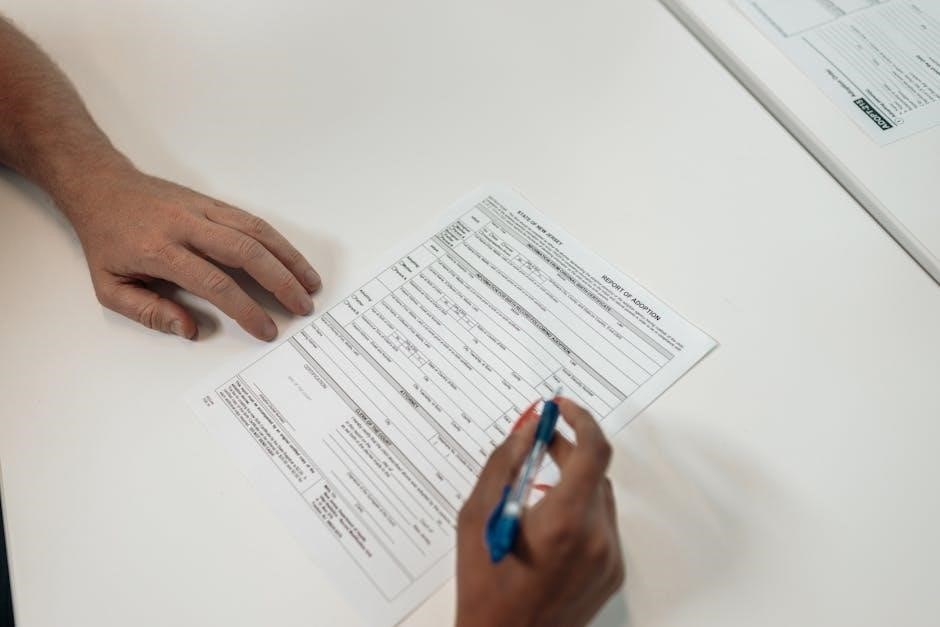A Georgia Power of Attorney (POA) is a legal document enabling individuals to appoint another to manage their financial, health, and property matters effectively.
1.1 Definition of Power of Attorney in Georgia
A Power of Attorney (POA) in Georgia is a legal document that allows individuals (the principal) to grant authority to another person (the agent) to act on their behalf. Under O.C.G.A. 10-6B-2(7), a POA is defined as a writing or record that grants an agent the power to act in the place of the principal. The agent can manage financial, legal, or personal matters, with authority ranging from broad to specific, depending on the type of POA chosen. It must be signed in the presence of a notary and witnesses to be valid.
1.2 Importance of Using a Power of Attorney Form
Using a Power of Attorney form in Georgia is crucial for ensuring continuity in managing your affairs during incapacity or unavailability. It allows a trusted agent to handle financial, legal, and personal matters, preventing delays or court intervention. A POA provides peace of mind by ensuring decisions align with your wishes. It’s essential for incapacity planning and maintaining control over your life without requiring guardianship. Using the official Georgia form ensures compliance with state laws and clarifies the scope of authority for your agent.

Types of Power of Attorney in Georgia
Georgia offers various Power of Attorney types, including General, Limited, Durable, Springing, Health Care, Vehicle, and Tax, each tailored for specific needs and situations.
2.1 General Power of Attorney
A General Power of Attorney in Georgia grants an agent broad authority to manage the principal’s financial affairs, including real estate, banking, and business transactions. It is not limited to specific tasks and remains effective until revoked. This type of POA is ideal for individuals who trust their agent to handle all financial matters. The document must be signed in the presence of a notary and a witness to be valid. It provides comprehensive control over the principal’s assets and affairs.
2;2 Limited Power of Attorney
A Limited Power of Attorney in Georgia restricts the agent’s authority to specific tasks or situations, as defined by the principal. It is often used for temporary or particular purposes, such as managing real estate transactions or handling financial matters while the principal is unavailable. This type of POA does not grant broad powers and terminates once the specified objectives are fulfilled or the timeframe expires. It is ideal for individuals who wish to maintain control over most aspects of their affairs but require assistance in limited areas.
2.3 Durable Power of Attorney
A Durable Power of Attorney in Georgia remains effective even if the principal becomes incapacitated, ensuring continuous management of financial affairs; It is often used for long-term planning, allowing the agent to handle tasks like bill payments, property management, and financial investments. This type of POA is ideal for individuals preparing for potential incapacity. Under Georgia law, it is durable by default unless stated otherwise, providing peace of mind and legal protection for the principal’s interests.
2.4 Springing Power of Attorney
A Springing Power of Attorney in Georgia becomes effective only upon a specific event, such as the principal’s incapacitation. Unlike durable POAs, it does not grant immediate authority to the agent. This type is often chosen by individuals who wish to maintain control over their affairs until they are unable to act. The triggering event must be clearly defined, and the document must comply with Georgia’s legal requirements for execution and witness validation to ensure its enforceability and protect the principal’s interests effectively.
2.5 Health Care Power of Attorney
A Georgia Health Care Power of Attorney allows individuals to appoint an agent to make medical decisions on their behalf if they become incapacitated. This document ensures that the principal’s health care preferences are honored, including decisions about treatments, surgeries, and end-of-life care. It is often included in an Advance Directive for Health Care, combining both health care and durable financial powers. The form must be signed, witnessed, and notarized according to Georgia state laws to be legally binding and effective in protecting the principal’s health care autonomy.
2.6 Vehicle Power of Attorney (Form T-8)
The Georgia Vehicle Power of Attorney, known as Form T-8, empowers an agent to handle vehicle-related matters on your behalf. This includes registration, titling, and representation in transactions. The form requires specific details such as vehicle make, model, and VIN. It is often used for convenience when the vehicle owner is unavailable to handle these tasks personally. The agent’s authority is limited to the scope outlined in the form, ensuring targeted representation for automotive affairs in Georgia.
2.7 Tax Power of Attorney (Form RD-1061)
The Georgia Tax Power of Attorney, Form RD-1061, allows individuals to appoint an agent to represent them before the Department of Revenue. This form is specifically designed for tax-related matters, enabling the agent to file returns, manage audits, and handle other tax obligations. It ensures the agent can act on behalf of the principal for all tax issues, providing a focused authority limited to tax affairs. The form is available as a PDF for easy access and completion.

Legal Requirements for a Georgia Power of Attorney
A Georgia POA must be signed by the principal, witnessed, and notarized. It is governed by the Georgia Power of Attorney Act (O.C.G.A. 10-6B-1 ⎼ 10-6B-23).
3.1 Signing Requirements
A Georgia Power of Attorney must be signed by the principal in the presence of a notary public and at least one witness. The principal must have legal capacity to sign, ensuring the document’s validity. The notary verifies the principal’s identity and willingness to execute the POA. Witnesses must also acknowledge the principal’s understanding of the document. This formal process ensures the POA is legally binding and protects all parties involved. Proper execution is essential for the agent to act on the principal’s behalf effectively.

3.2 Witness and Notarization Requirements
In Georgia, a Power of Attorney must be signed in the presence of a notary public and at least one witness. The witness must acknowledge the principal’s understanding and willingness to execute the document. The notary verifies the principal’s identity and capacity to sign. The witness cannot be the agent named in the POA to avoid conflicts of interest. This dual authentication ensures the document’s legality and validity, protecting the principal’s rights and the agent’s authority to act on their behalf.
3.4 Georgia Power of Attorney Act (O.C.G.A. 10-6B-1 ⎼ 10-6B-23)
The Georgia Power of Attorney Act governs the creation and execution of POA documents, ensuring clarity and protection for all parties involved. Under this act, a Power of Attorney is defined as a written record granting authority to an agent to act on behalf of the principal. It outlines requirements for durability, revocation, and termination events. The act also provides a statutory form (O.C.G.A. 10-6B-70) that, while not mandatory, offers a standardized template for compliance. This framework protects both the principal’s rights and the agent’s responsibilities, ensuring legal validity and enforceability across the state.

How to Create a Georgia Power of Attorney Form
Creating a Georgia Power of Attorney involves obtaining the form, specifying the agent’s authority, signing in the presence of a witness, and notarization for legal validity.
4.1 Downloading the Form (PDF)
The Georgia Power of Attorney form can be downloaded as a PDF from official government websites such as georgia.gov or legal document providers. Ensure the form is specific to Georgia and aligns with your needs, such as durable, general, or limited POA. The form is often titled “Statutory Form Power of Attorney” under O.C.G.A. 10-6B-70. Downloading from reputable sources guarantees compliance with state laws. Some third-party sites may require verification or subscriptions to access the form;
4.2 Filling Out the Form
Filling out the Georgia Power of Attorney form requires careful attention to detail. Start by identifying the principal and agent, including their full names and addresses. Specify the powers being granted, such as financial management or health care decisions, and set the effective date. For durable POAs, include language allowing continued authority if the principal becomes incapacitated. Ensure all sections are completed accurately to avoid legal complications. Review the document thoroughly before signing and notarizing as per Georgia state requirements. Seek legal advice if unsure about any part of the form.
4.3 Special Instructions and Customization
Special instructions and customization allow you to tailor the Georgia Power of Attorney form to your specific needs. You can include additional clauses or modify existing ones to grant or restrict certain powers. For example, you might specify conditions for when the POA takes effect or list particular assets or decisions the agent can manage. Customization ensures the document aligns with your goals and circumstances. However, it’s crucial to comply with Georgia state laws and seek legal advice to avoid errors or omissions in the final document.
4.4 Execution and Notarization
Proper execution and notarization of a Georgia Power of Attorney form are essential for its validity. The principal must sign the document in the presence of a notary public and at least one witness. The notary will verify the principal’s identity and confirm their willingness to execute the document. Once signed, the POA becomes legally binding, granting the agent authority to act on the principal’s behalf. Ensure all signatures and notarization details are clearly recorded to avoid any legal challenges. This step finalizes the document, making it enforceable under Georgia state laws.

Key Elements of a Georgia Power of Attorney Form
A Georgia POA form must include the principal’s and agent’s details, scope of authority, effective date, successor agents, and termination clauses to ensure clarity and legality.
5.1 Principal and Agent Information
The principal is the individual granting authority, while the agent is the person authorized to act on their behalf. Both parties’ full names, addresses, and signatures are required for legal validity.
5.2 Scope of Authority
The scope of authority in a Georgia Power of Attorney outlines the specific powers granted to the agent by the principal. It defines the actions the agent can take, such as managing real estate, handling financial affairs, or making decisions about personal property. This section ensures clarity and prevents overstepping of boundaries, allowing the principal to tailor the agent’s responsibilities to their needs. It may also include limitations or expansions of authority based on the principal’s preferences.
5.3 Effective Date and Duration
The effective date of a Georgia Power of Attorney determines when the agent’s authority begins. It can take effect immediately or at a future date specified by the principal. The duration is typically indefinite, lasting until the principal revokes the document or a termination event occurs, such as the principal’s death. If the POA is durable, it remains in effect even if the principal becomes incapacitated. Specific instructions within the form can customize the timeframe and conditions under which the agent’s powers commence and expire.
5.4 Successor Agents
A Georgia Power of Attorney allows the principal to name successor agents to ensure continuity if the primary agent becomes unable or unwilling to act. Successors can be listed in order of preference, with specific conditions for when they assume authority, such as the incapacity or resignation of the prior agent. This ensures the principal’s affairs are managed seamlessly without requiring a new POA. The document may also outline how successors are notified and under what circumstances they take over, maintaining the integrity of the principal’s wishes.
5.5 Termination Clauses
A Georgia Power of Attorney includes termination clauses that outline when the document ceases to be effective. It may end due to the principal’s revocation, the agent’s inability to act, or the accomplishment of its purpose. Termination can also occur if the principal passes away, unless the POA is durable and specifies otherwise. The principal must provide written notice of revocation to the agent and any relevant parties. This ensures clarity and protects all parties involved by formalizing the end of the agent’s authority.

Special Considerations
Special considerations include understanding the durability of the POA, revocation processes, agent responsibilities, and liability protections. These factors ensure the document aligns with the principal’s intent and legal standards.
6.1 Durable vs. Non-Durable Power of Attorney
A durable power of attorney remains effective even if the principal becomes incapacitated, while a non-durable POA terminates in such cases. Durable POAs are often preferred for long-term planning, as they ensure uninterrupted management of affairs. Non-durable POAs are typically used for specific, short-term situations. In Georgia, a POA is durable unless explicitly stated otherwise. Understanding the differences is crucial for ensuring the document aligns with the principal’s needs and provides continuity in decision-making authority.
6.2 Revocation of Power of Attorney
A power of attorney can be revoked by the principal through a written notice, which must be delivered to the agent. The revocation becomes effective when the agent receives it. In Georgia, the principal can revoke the POA at any time, provided they are competent. If the principal is married, filing for divorce automatically revokes a spouse’s authority unless the POA specifies otherwise. The principal’s death also terminates the POA, as it no longer grants authority. Proper documentation and communication are essential to ensure the revocation is legally binding and recognized.
6.3 Responsibilities of the Agent
The agent is legally bound to act in the best interest of the principal, following the instructions outlined in the Georgia Power of Attorney document. They must maintain accurate records of all transactions and decisions made on behalf of the principal. Agents are prohibited from engaging in self-dealing or conflicts of interest. They must also act with reasonable care, skill, and diligence, as dictated by the circumstances. Additionally, the agent is required to keep the principal informed and comply with all applicable laws and the specific terms of the POA.
6.4 Liability and Protection for the Agent
The agent acting under a Georgia Power of Attorney is protected from liability if they act in good faith, within the scope of authority, and in accordance with the principal’s instructions. Liability arises only from willful misconduct, gross negligence, or reckless disregard for the principal’s interests. Agents must avoid conflicts of interest and self-dealing. The law requires agents to maintain accurate records and account for all actions taken on behalf of the principal, ensuring transparency and accountability to the principal or court, if necessary.

Common Uses of a Georgia Power of Attorney
A Georgia Power of Attorney is commonly used for financial management, healthcare decisions, real estate transactions, vehicle registration, and tax representation, ensuring your interests are protected.
7.1 Financial Management
A Georgia Power of Attorney is widely used for managing financial affairs, allowing the agent to handle bank accounts, investments, real estate, and business transactions. It ensures bills are paid, taxes are filed, and financial decisions are made on behalf of the principal. This authority is especially crucial if the principal becomes incapacitated, as a durable POA remains effective, safeguarding financial stability and continuity. The agent can also oversee retirement accounts and other assets, ensuring the principal’s financial well-being is maintained.
7.2 Health Care Decisions
A Georgia Power of Attorney for health care allows the agent to make medical decisions on behalf of the principal when they are unable to do so. This includes consenting to or refusing treatments, selecting healthcare providers, and accessing medical records. The Georgia Advance Directive for Health Care combines a health care POA with a living will, ensuring the principal’s wishes are honored. This document is essential for maintaining control over medical care during incapacitation, providing peace of mind for both the principal and their family.
7.3 Real Estate Transactions
A Georgia Power of Attorney allows the agent to manage real estate transactions on behalf of the principal; This includes buying, selling, leasing, or managing properties. The agent can execute deeds, negotiate contracts, and handle all related legal matters. This authority is particularly useful for individuals who are unable to handle real estate dealings personally. The POA ensures seamless management of property affairs, maintaining the principal’s interests effectively and efficiently.
7.4 Vehicle Registration and Representation
A Georgia Vehicle Power of Attorney (Form T-8) enables individuals to appoint another person to handle vehicle-related matters, such as registration, title transfers, and representation in legal proceedings. This form is essential for managing automotive affairs when the principal is unable to act personally. It ensures seamless processing of vehicle transactions, providing convenience and efficiency in maintaining compliance with state regulations. The agent can act on behalf of the principal, making decisions and executing necessary documentation for vehicle ownership and administration.
7;5 Tax Representation
A Georgia Tax Power of Attorney (Form RD-1061) allows individuals to appoint an agent to represent them in tax-related matters before the Department of Revenue. This form is essential for handling tax filings, audits, and negotiations on behalf of the principal. It ensures the agent can legally act in the principal’s best interest, managing tax obligations and resolving disputes efficiently. This form is particularly useful for individuals who need assistance with complex tax issues or are unable to handle them personally.

Resources and Downloads
Official Georgia government websites offer downloadable PDF forms, including the Statutory Form Power of Attorney and specialized forms like T-8 for vehicle representation.
8.1 Official Georgia Government Websites
Official Georgia government websites provide reliable resources for Power of Attorney forms. The Georgia Secretary of State and Department of Revenue websites offer downloadable PDF templates, including the Statutory Form Power of Attorney and specialized forms like T-8 for vehicle representation. These sites ensure compliance with state laws, offering clear instructions and guidelines for execution. Accessing these resources guarantees accurate and legally valid documents tailored to various needs, from financial management to healthcare decisions.
8.2 PDF Forms and Templates
Georgia Power of Attorney forms are widely available as downloadable PDF templates. The Georgia Secretary of State website offers a Statutory Form Power of Attorney, while the Department of Revenue provides Form RD-1061 for tax representation. Vehicle-related POAs, such as Form T-8, can also be downloaded in PDF format. These templates ensure compliance with state laws and are easily customizable to suit individual needs. They provide a convenient and legally valid way to establish authority for financial, healthcare, or property management without requiring legal assistance.
8.3 Legal Assistance and Consultation
Consulting an attorney is recommended when creating a Georgia Power of Attorney to ensure compliance and suitability for individual circumstances. Legal professionals can guide the selection of the appropriate form, whether it’s durable, general, or limited; They assist in customizing the document, especially for complex cases involving real estate or tax matters. Additionally, organizations like the Georgia Bar Association offer resources and referrals to qualified lawyers who specialize in estate planning and power of attorney law.

FAQs About Georgia Power of Attorney
Common questions include how to create a POA, its revocation process, and its validity across state lines. Consulting a legal expert is advised for complex cases.
9.1 Can I Create My Own Power of Attorney?
Yes, you can create your own Power of Attorney in Georgia. The state provides statutory forms, such as the Georgia Statutory Form Power of Attorney, which you can download as a PDF. It is essential to use a form specific to Georgia to ensure compliance with state laws. The document must be signed in the presence of a notary and witnesses. However, consulting a legal professional is recommended to avoid errors and ensure your document meets all legal requirements. This ensures your wishes are clearly stated and legally binding, providing peace of mind for both you and your agent.
9.2 How Do I Revoke a Power of Attorney in Georgia?
To revoke a Power of Attorney in Georgia, you must provide written notice to the agent and any third parties involved. The revocation should be in writing, signed, and notarized. File the revocation with the Clerk of the Superior Court in the county where the POA was executed or where you reside. This ensures the agent’s authority is formally terminated. If the POA is durable, revocation must be recorded to prevent unintended continuation of the agent’s powers. Consulting a legal professional is recommended to ensure compliance with state laws and proper execution.
9.3 Can a Power of Attorney be Used Across State Lines?
A Georgia Power of Attorney can generally be recognized in other states due to the Full Faith and Credit Clause of the U.S. Constitution. However, enforcement may vary by state laws. It’s advisable to consult an attorney in the state where the POA will be used to ensure compliance and effectiveness. Some states may require additional documentation or specific wording to honor the document across state lines, especially for real estate or financial transactions outside Georgia.
